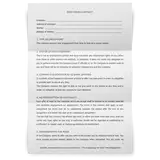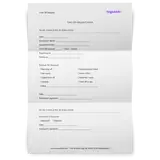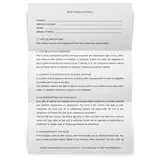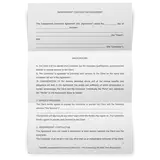Are you a project manager who needs to draft a budget proposal?
If it’s your first time penning such a document, you may feel a little nervous about how it should look and what information it should include.
While creating a budget proposal can be a little difficult, the process can be significantly easier through the use of templates and our handy how-to guide.
Ready to learn all about budget proposals? Let’s start by breaking down exactly what a budget proposal is.
What is a Budget Proposal?
A budget proposal is a highly detailed sales pitch for a project within a business. Such proposals come with a variety of research to back up the proposal’s claims, from studies to on-site testing to data analysis.
Budget proposals are usually used in business, academic, and nonprofit organizations. They precede (and in some cases, are part of) a grant proposal for a project. A grant proposal is simply a proposal that formally asks for funding for a project with the promise of some form of monetary return.
Writing a budget proposal is a great idea and serves as an excellent tool because it allows the writer, stakeholders, investors, and managers to understand the entire scope of the project and its financial requirements before it is formally presented. Creating a very accurate representation of all of the financial requirements for the project is key to making a great proposal. However, it’s also extremely important to frame the proposal in a way that makes the costs requested sound reasonable and makes the project as a whole sound very valuable when it is complete.
This is what can make a budget proposal a bit tricky to write effectively. Luckily, there are tons of templates and samples you can get inspired by (which we’ll be including in this guide!) to help you get a frame of idea of what the proposal should look like.
Before we dive into the how-tos, let’s look at some popular budget proposal samples from around the web:
- Simple Budget Proposal Example - https://www.template.net/pro/12658/simple-budget-proposal
- Business Budget Proposal Sample - https://www.template.net/pro/10818/business-budget-proposal
- Budget Proposal Example - http://www.budgettemplate.net/sample-budget-proposal-format/
- Event Budget Proposal - https://www.template.net/pro/10364/event-budget-proposal
- Restaurant Budget Proposal Example - https://www.template.net/pro/11786/restaurant-budget-proposal
How to Properly Write a Budget Proposal
Now that we have some budget proposal examples to get inspired by, let’s break down all of the elements your budget proposal will need.
Planning
This is the most important step in writing a budget proposal. The main things you will need numbers for are labor, equipment items and materials, and miscellaneous costs. Absolutely every aspect of products, services, and labor that will go into the project needs to be accounted for and their individual unit prices calculated. Before even beginning your budget proposal, make sure you have all of this information ahead of time.
Just as well, it would be wise to have all contact information and business names on hand (and possibly included in the budget proposal itself for reference) of all relevant contractors, product manufacturers, travel agencies, etc.
Remember to be convincing and thorough
A budget proposal requires more thought and planning than simply filling in the blanks of a template. Though, we will be offering a free template at the end of this guide to help you along. Templates are great for aesthetic and organizational purposes-- however, when it comes down to the content of a budget proposal, it’s all on the shoulders of the proposal writer.
There are a number of things to remember when drafting the copy for your budget proposal, namely the justification or reasoning sections for each of your costs:
- Be clear about the project’s purpose.
- Always identify the strengths of the project and your cost choices.
- Be succinct and professional with your language.
- Length does not always equal quality. The key to a great budget proposal is balancing brevity with quality.
- Demonstrate preparedness in your justifications.
- Display a substantial knowledge of the project and the industry it involves.
- Tie in the concept of this budget proposal to previous successful (but relevant) budget proposals you have written.
- Connect your introduction to the overall goals of the grant you’re seeking.
- Always write budget proposals for educated people, not specialists. Don’t be overly technical or use jargon.
- Be sincere and honest about your plans for the project, but always try to frame your words in a positive and convincing light.
- Properly cite all of the sources in your proposal if applicable. Some budget proposals that aren’t in the academic or science niche may not require citations.
- Write to persuade.
- Demonstrate why your project is deserving of a grant and be sure to include your own personal (but relevant) qualifications as the proposal writer.
- Double and triple-check your costs to ensure all of your estimates are accurate and nothing is missing.
Sit down with your template and fill in the blanks
Now that we have some idea of what should go into a budget proposal, it’s time to fill in each section of your proposal template.
To start, download our FREE budget proposal template.
Make sure that all of your titles, logos, and [FILL IN] sections include the proper information. Your submission dates, project titles, business names, and signatures should all be filled in and accurate. We recommend running through the finished proposal a few times to ensure there are no missing titles, grammar and spelling mistakes, or misinformation with costs.
Always include the total amount estimated or requested for each section. Listing an individual product’s unit cost won’t be enough to paint a broad picture of the budget for stakeholders. Double and triple check your math at each section, especially at the very end under the “Cost Summary” section. These are the numbers that stakeholders are immediately going to look at.
Once you’ve filled everything in, congrats! You’ve successfully written a budget proposal that is ready to be sent.
Myth busting: common misconceptions about budget proposals
Budget proposals are crucial for securing funding and managing project costs effectively, but there are several misconceptions that can lead to confusion. Let’s address and clarify five common myths related to budget proposals to enhance your understanding of this important financial tool.
Myth 1: budget proposals are only for large projects
Clarification: A budget proposal is essential for projects of any size, not just large ones. Whether you’re planning a small community event or a large-scale business venture, a detailed budget proposal helps outline the estimated costs and ensures that all cost elements are considered. Using a simple budget template can be just as effective for smaller projects to track direct costs and indirect costs.
Myth 2: a budget proposal template is complicated to use
Clarification: Many believe that using a budget proposal template is complex and time-consuming. However, there are many free budget proposal templates available that are user-friendly and designed to simplify the process. These templates help break down the cost elements such as labor costs, travel expenses, and server fees, making it easier to compile a comprehensive cost breakdown for the proposed project.
Myth 3: you don’t need a budget proposal for small business proposals
Clarification: Regardless of the size of the business, a budget proposal is vital for planning and securing funding. Small businesses and startups benefit greatly from detailed business proposals that include a proposed budget. This helps in demonstrating the anticipated revenue and the total cost of the project to potential investors, ensuring that financial decisions are well-informed.
Myth 4: indirect costs are not important in a budget proposal
Clarification: Ignoring indirect costs can lead to an incomplete and inaccurate budget. Indirect costs like administrative expenses, utilities, and project management software fees are essential components of the total costs. Properly accounting for both direct and indirect costs ensures a more realistic and comprehensive budget, which is crucial for the particular project.
Myth 5: only financial experts can create an effective budget proposal
Clarification: While having a financial background can be beneficial, anyone can create an effective budget proposal with the right tools and information. Utilizing a proposal template or a budget template simplifies the process. Including detailed sections for direct labor, travel costs, supporting documents, and cost breakdowns ensures that all aspects of the project are covered. Additionally, many templates provide guidance on how to present your proposed budget clearly to potential investors or stakeholders.
By understanding these myths and the facts behind them, you are better equipped to create effective budget proposals for any project. Utilizing resources like simple budget templates and seeking input from team members can significantly enhance the accuracy and clarity of your budget, making it a valuable tool for planning and securing funding for your upcoming project.
![Project Budget Proposal - Template & Sample [FREE Download] (Word)](/static/image?src=https%3A%2F%2Fcdnblog.unrubble.com%2Fpayload-unrubble-images%2FBudget-Proposal-Template-600x600.png&width=512&height=512&fit=contain&position=center&quality=65&compressionLevel=9&loop=0&delay=100&crop=null&contentType=image%2Fwebp)




